Special Feature 3
Nichimo’s human resource strategy
As a company with a history spanning more than a century, Nichimo sees employees as its most important management resource. We consider them as valuable human assets and as the source of increased corporate value.
As a company mainly involved in the fishing and marine product business fields, the Nichimo Group’s strengths lie in its specialization and uniqueness in each business area.
These strengths are supported by power of each individual employee to carry out their duties involving stakeholders.
Based on these, our human resource strategy is to “grow people (employees) into stronger individuals and connect them” as the foundation for covering “From Ocean To Dining,” which is also expressed in the basic concept of the Fiscal 2023 Medium-Term Management Plan.
The specific kinds of qualities we seek to develop in people are a combination of “flexibility” that enables cooperation with people who have different values, an “intrepid spirit” to boldly take on the challenge of new business opportunities, and the “toughness” to see things through to the end.
This concept means that we leverage the capabilities of each employee to their fullest extent to grow them into strong individuals, use their experience and expertise in businesses that create new value, and then increase our corporate value over the medium and long term, and ultimately move forward into a future where we lead the industry as a public organ of society expressed in our corporate philosophy.

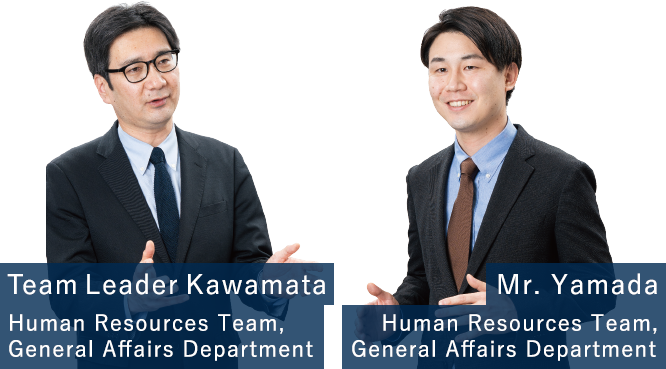
Initiatives to date Initiatives for the future
Today
Tomorrow
In addition to level-specific training, we have been implementing specialized training needed for working in today’s operations, such as trade and computer skills.
We have also taken steps to secure education opportunities for all employees, using e-learning.
In the VUCA*1 era, all manner of things, such as economy, business, and individual careers, are becoming increasingly complex, and it is becoming difficult to forecast the future. We can envisage a scenario where past experience does not help to solve the problems of the future.
This is another reason why it is essential for individual employees to upskill and grow into strong individuals.
As a measure to address this, we will visually represent the skills required by employees and use this to promote reskilling to develop human resources who are able to actively participate in roles across the business.
We will also create clear training plans and check on employees’ progress and level of achievement.
Training (reskilling)
Nichimo’s business environment is changing significantly, including a falling birthrate and aging population, workstyle reforms, and the COVID-19 pandemic.
Under these conditions, we have been working to provide a better work environment, with measures for childcare and family care in line with laws and regulations, and the needs of the times, and the introduction of staggered work shifts and so forth.
We have also been working to identify problems and issues through means such as dialogue with employees and assessments.
Japan is seeing an emergent decline in the working age population following a low birthrate and aging population. It is therefore necessary to create work environments that enable people to work more efficiently.
To ensure that we continue to be a preferred employer going forward, we will create work environments that enable the creation of new value, including introducing personnel systems that are highly acceptable to employees, and enabling people to acquire a broad range of knowledge through job rotation and personal exchanges within the Group.
Work environment
We have been actively promoting a leave system for employees in the childraising generation, and encouraging the use of childcare leave by male employees and so forth.
Moreover, we are also examining system revisions to enable female employees to realize their potential.
As Japan’s working age population declines, diversity is becoming an important issue from a perspective of company growth, among others.
It is particularly important to create a system that allows women to engage in primary roles of business operations.
To help achieve this, we will take steps to increase the ratio of female hires in our annual recruiting drive, as well as the ratio of female managers.
Female
participation
In an effort to ensure safe work environments for employees, we coordinate with specialists including industrial physicians and nurses to ascertain the status of employees’ mental and physical health, and to follow up carefully if any issue exists.
Furthermore, we have implemented measures such as a system for managing work hours to prevent long working hours.
To ensure that our employees continue to be valuable human assets and an important management resource, we will actively support their activities to maintain and improve their health and implement measures to promote health.
We will take a systematic approach to health care, with the aim of earning recognition as a Certified Health & Productivity Management Outstanding Organization.
We believe that good employee health will increase our corporate value for connecting to the future.
Health care
Connecting strong individuals to business and the future
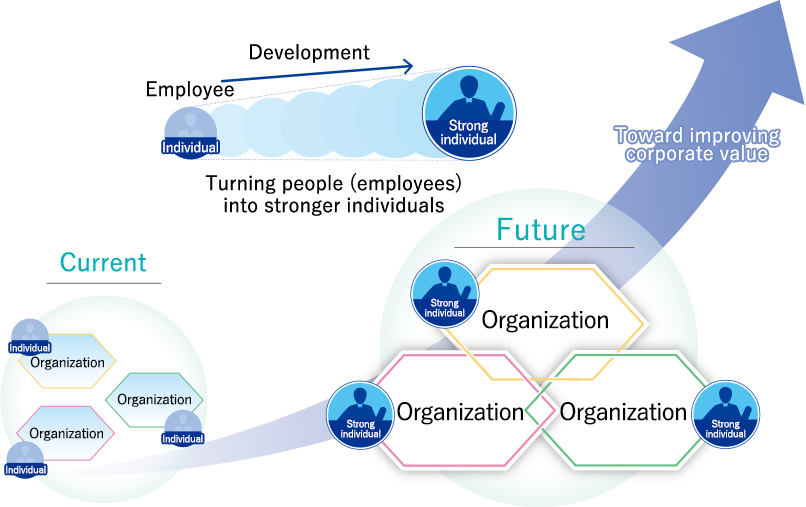
Strong individuals form groups and expand strong organizations,
collaborating to increase corporate value
Key issues and KPIs
The Company has identified four key issues to be addressed by 2030 for establishing a foundation for human resource development and has set corresponding key performance indicators (KPIs) for each one.
The Board of Directors will monitor the status of progress on these KPIs.
| Key issue | KPI | |
|---|---|---|
| 1 | Visualization of human resource information and measures | Acquisition of ISO 30414 certification ⇒Establishment of internal and external guidelines for human capital |
| 2 | Sharing a Group-wide vision | 100% understanding of the vision ⇒Announcement of the corporate philosophy and vision within the Nichimo Group (Strengthen ER*2) |
| 3 | Creation of a plan for human resource retention and development | Employee turnover of no more than 5% ⇒Creation of a plan for controlling the annual turnover excluding retirement and developing human resources, and monitoring of the status of achievement |
| 4 | Diversity | Ratio of female hires (50%) *3, ratio of female managers (10% or higher), rate of men using childcare leave (100%) |
Achievement and road map of long-term vision
We have classified the points to focus on for developing human resources who can realize our vision for covering “From Ocean To Dining .” We will develop human resources over the medium to long term in two stages.
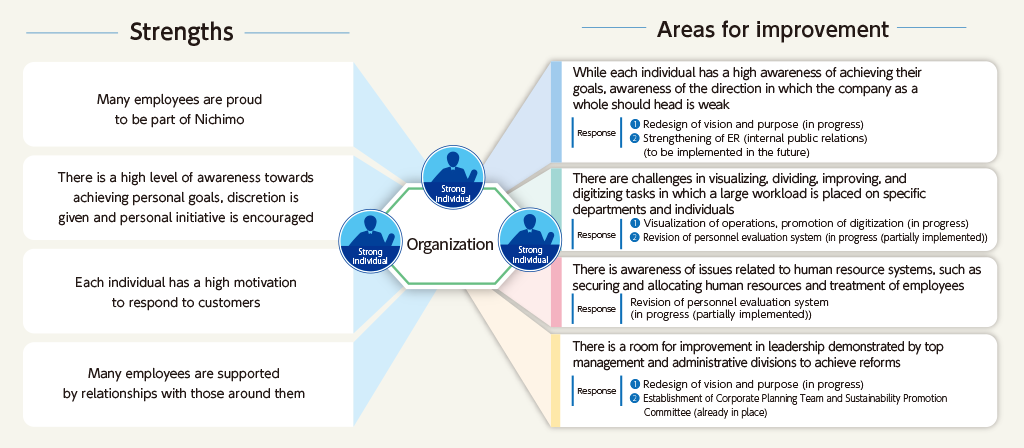
- *1 VUCA stands for Volatility, Uncertainty, Complexity, and Ambiguity.
- *2 ER stands for Employee Relations. Information activities for company employees and labor unions.
- *3 Includes general employees.
Next-Generation Employees Discuss Nichimo
Today and Tomorrow

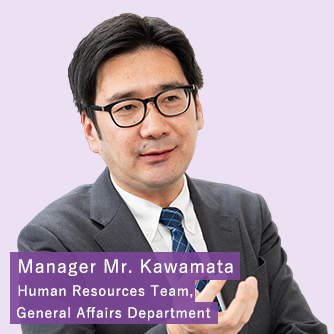
Ochiai
I think the appealing point about Nichimo is that it develops products in cooperation with customers.
I work in the Marine Business Division. I’m involved in the design and development of fishing nets in Shimonoseki City, Yamaguchi Prefecture. We ask fishermen to look at model experiments made using a large experimental tank and give us their opinions so that we can develop fishing gear that meets customers’ needs.
We also reflect their opinions in the development of environmentally friendly biodegradable materials and so forth.
Nakayama
Nichimo is a company that values encouraging people who would like to take on a challenge. If people feel like trying something, they are encouraged to try.
I work in the Synthetic Products Department, where I can say to my boss, “Right now we are working like this, and the customer’s response is like that.
So I want to try taking on a challenge like this.” I report the situation in this manner and the boss gives me their opinion.
I also like the way that team members have a relationship where they can give each other advice.
Sometimes I go with my team members to the recreation facility and we share opinions with each other.
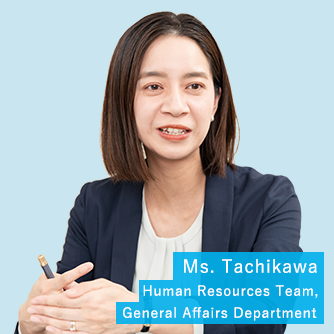
Oi
Nichimo has just over 200 employees, and I think this makes for a good atmosphere.
I sell food processing machines in the Machinery Engineering and Sales Department. In addition to the good atmosphere within the department, we also cooperate closely with other departments.
For example, we cooperate with the Synthetic Products Department where Mr. Nakayama works to sell cardboard boxes, food trays, and packaging materials, and we cooperate with the people in the Food Business Departments to sell scallop adductor muscles.
Tanoguchi
As Mr. Oi said, we handle various merchandise in cooperation between departments, and we conduct world-wide operations.
I work in the Treasury Department, and I am sometimes tasked with making payments for raw materials purchased overseas. Through my work, I can learn about the systems in various different countries.
I think it is an appealing point that I can experience working not only on transactions that take place in Japan, but those that involve overseas business as well.
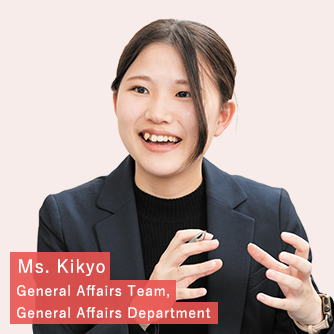
Tsuchida
Understanding and consideration from the Company regarding employees’ work-life balance is essential for enabling them to continue working over the long term. I work in the Food Quality Management Department, where I had used the childcare leave system until March 2023.
Being able to use this system gave me a sense of security.
Recently, men have started to use the childcare leave system as well. Support from the Company is also necessary for them to overcome the barriers to taking childcare leave.
Iwameji
Like Ms. Tsuchida, I am also balancing childcare and work.
I am in charge of sales in the Food Business Division. I have been able to do my job while caring for my children .
The reason for this is because we have a system where team members support one another.
In my team, we have excellent cooperation, which really helps me. But I feel there is some difference in the level of enthusiasm between teams, and I think that is an issue to be addressed.
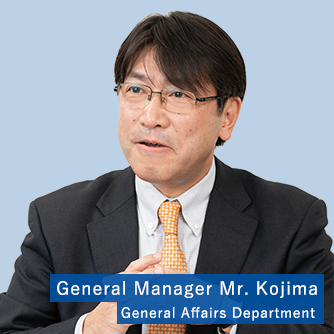
Ochiai
In my workplace, there aren’t any women balancing work and childcare, so I’m not really able to imagine how I would be
able to do that in the future, and I feel some anxiety about it.
I feel a sense of satisfaction in working near to the front lines, so I feel unhappy about the idea of being restricted in doing the work I want to do for the sake of balancing work and childcare.
Tanoguchi
With an increase in the number of women in the workplace, I hope we will have workplace environments that are easier for women to work in.
Working under male managers in a department with only one or two women, our voices always tend to be treated as a minority opinion.
As the number of female managers increases, I think there will be more opportunities for women’s voices to be heard. Also, they will become role models, which should increase motivation for other women.
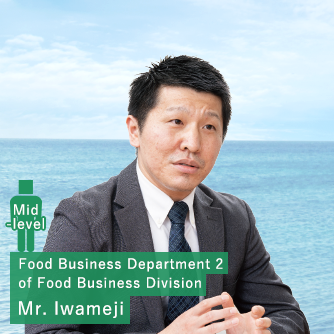
Iwameji
Marine resources are limited, and their supply fluctuates severely due to various factors.
In this situation, I believe Nichimo’s mission is to provide a stable supply of high quality marine products for consumers’ tables.
The pillars of the Food Business are surimi (kneaded fish meat), crab, pollack roe, frozen fish, and processed products. In addition to delivering them to diners, I believe we should also take on new challenges going forward.
I myself would like to be actively involved in such a challenge.
I also think that we should promote the appeal of the Nichimo brand more strongly, so that its value will be more highly appreciated by end consumers.
Nakayama
I am in charge of construction film. As Japan’s falling birthrate and aging population accelerate further, the number of new housing starts is expected to decrease, and so we need to take some kind of action.
I don’t think that the need for the film that Nichimo provides will disappear, but there should be a number of areas where we should take a proactive approach, such as medical and nursing care facilities, the number of which is expected to grow in the future.
Within the cycle that Nichimo seeks to cover “From the Ocean To Dining,” there is also the housing space.
For example, I think we could provide interior finishing for food product plants, and so forth, or create new products through collaboration between departments, which is one of Nichimo’s strengths.
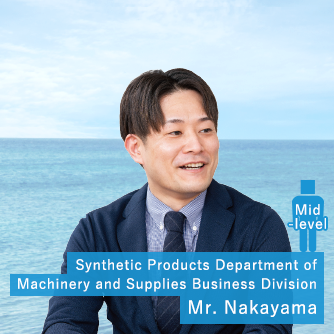
Oi
I am involved in machinery sales, so I have a really strong sense of the serious shortages of labor that customers are facing.
Needs for labor saving and mechanization seem likely to increase going forward.
In order for Nichimo to understand customer needs even more closely and resolve their issues, it might be necessary to acquire machinery manufacturing functions through M&A and so forth, and use expertise in machinery in dialogue with customers.
Providing high level expertise that increases the level of trust in our relationships with customers might enable us to capture various business opportunities outside of machinery as well.
Tsuchida
I think that Nichimo’s strengths are in its small number of elite, highly expert individuals, and in the smoothly functioning cooperation between departments. However, I feel that the expertise of individuals is mainly used at the individual level, and hasn’t yet really been shared or passed on so that the knowledge can be used by the organization.
While cooperation is working well horizontally, there isn’t enough vertical cooperation.
If Nichimo has overcome this issue in ten years’ time, then it will have created products and developed businesses that bring together the strengths that currently exist in isolated pockets inside the Company.
I’d like to work towards achieving that myself going forward.
